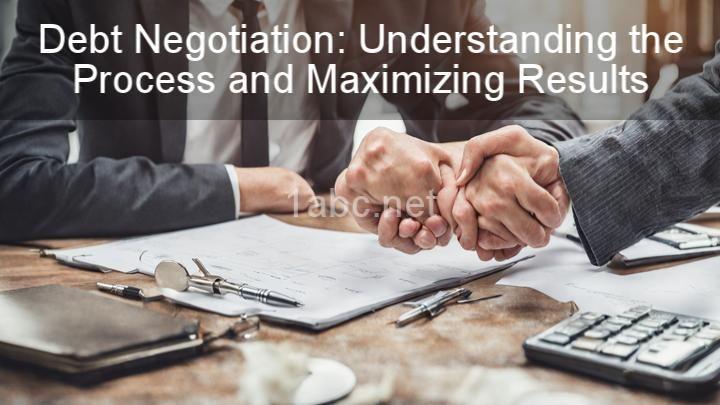Navigating Debt Negotiation: Common Mistakes to Avoid

Introduction:
Dealing with debt can be a stressful and overwhelming experience. It's not uncommon to feel trapped and unsure of how to move forward. However, it's crucial to remember that you're not alone in this journey. Many individuals face financial challenges at some point in their lives, and there are strategies and resources available to help you navigate your way out of debt.
In this blog post, we'll explore the concept of debt negotiation and discuss common mistakes to avoid when tackling your debts. We understand the difficulties you may be facing, and we're here to offer guidance and support as you work towards financial freedom.
I. Understanding Debt Negotiation
Before we dive into the common mistakes to avoid, let's first understand what debt negotiation is and how it can help you manage your debts effectively. Debt negotiation, also known as debt settlement, involves negotiating with your creditors to reach an agreement on a reduced amount that you can afford to pay. This process can help you reduce interest rates, lower monthly payments, and ultimately avoid the need for bankruptcy.
Taking proactive steps towards addressing your financial difficulties is crucial. Ignoring your debts or burying your head in the sand will only make matters worse. Debt negotiation allows you to take control of your financial situation and work towards a manageable repayment plan.
II. Common Mistakes in Debt Negotiation
- Lack of Preparation
One of the most critical mistakes individuals make when entering into debt negotiation is a lack of preparation. Before engaging in negotiations with your creditors, it's essential to gather all necessary financial documents, create a budget, and assess your ability to make realistic repayment plans. By doing so, you'll have a clear understanding of your financial situation and be better equipped to present your case effectively.
- Failing to Communicate with Creditors
Open communication is key when it comes to debt negotiation. Failing to communicate with your creditors can lead to misunderstandings and missed opportunities for finding a mutually beneficial solution. It's crucial to reach out proactively, explain your financial situation honestly, and explore potential options for debt relief. Remember, creditors are often willing to work with you as long as you demonstrate a genuine commitment to repaying your debts.
- Ignoring Debt Collection Calls or Letters
When you're struggling with debt, it's natural to feel apprehensive about answering collection calls or opening letters from creditors or debt collectors. However, ignoring these communications is a mistake that can have serious consequences. It's vital to address these calls and letters promptly and professionally, ensuring that you protect your rights as a consumer. By handling these interactions assertively and responsibly, you can maintain control over the debt negotiation process.
- Falling for Scams or Unscrupulous Debt Relief Companies
Unfortunately, there are unscrupulous individuals and companies out there looking to take advantage of individuals seeking debt relief solutions. Falling for scams can exacerbate your financial difficulties and leave you in an even worse situation. It's crucial to be vigilant and educate yourself on how to identify legitimate debt relief companies. Reliable resources, such as government websites or consumer protection agencies, can help you find reputable assistance.
III. Strategies for Successful Debt Negotiation
Now that we've discussed common mistakes to avoid let's explore strategies for successful debt negotiation:
- Researching Available Options
It's essential to research the available debt relief options to determine the best path for your financial situation. Debt consolidation or settlement programs may be viable solutions for some individuals. By gathering information and understanding the pros and cons of each option, you'll be better equipped to make informed decisions. Reliable resources, such as government websites or reputable financial blogs, can provide valuable insights into the available options.
- Seeking Professional Guidance if Needed
Navigating the complexities of debt negotiation can be challenging, especially if you're unsure where to start. In such cases, seeking professional guidance can be immensely beneficial. Consider consulting with a credit counselor or financial advisor who specializes in debt management. These professionals can provide personalized advice tailored to your specific circumstances, helping you make sound financial decisions.
- Keeping Track of Negotiations and Agreements
During the debt negotiation process, it's crucial to maintain accurate records of all communications, negotiations, and agreements made with your creditors. Keeping track of these interactions will ensure clarity and avoid misunderstandings down the line. Documenting everything, including dates, names, and details of the conversations, will provide you with a solid foundation should any discrepancies arise.
Conclusion:
Tackling debt is undoubtedly a challenging journey, but with dedication and knowledge, you can regain control over your finances. By avoiding common mistakes, such as lack of preparation, failing to communicate with creditors, ignoring debt collection calls or letters, and falling for scams, you're already taking proactive steps towards successful debt negotiation.
Remember, staying positive and reaching out for support when needed is crucial. Utilize the strategies for successful debt negotiation discussed in this blog post, and don't hesitate to seek professional guidance if you're feeling overwhelmed. You have the power to navigate your way out of debt and achieve financial freedom. Good luck!
FREQUENTLY ASKED QUESTIONS
How does debt negotiation work?
Debt negotiation, also known as debt settlement, is a process where you or a professional negotiator work with your creditors to reduce the amount of debt you owe. Here's how it typically works:
-
Assessing your financial situation: Before starting the negotiation process, it's important to evaluate your financial situation. This includes gathering information about your debts, income, and expenses. Understanding your financial standing will help determine the best approach for negotiating with your creditors.
-
Building a negotiation strategy: Once you have a clear picture of your finances, it's time to develop a negotiation strategy. This may involve prioritizing your debts, identifying which creditors to negotiate with first, and determining the amount you can afford to pay.
-
Contacting your creditors: The next step is to reach out to your creditors and express your intent to negotiate your debt. You can either do this yourself or hire a professional debt negotiator to assist you. It's important to provide them with accurate information about your financial situation and explain why you're unable to repay the full amount.
-
Negotiating a settlement: During the negotiation process, you or your negotiator will work with your creditors to reach a mutually agreed-upon settlement amount. This may involve negotiating a reduced principal balance, lower interest rates, or a more manageable repayment plan. The goal is to find a solution that both parties can agree on.
-
Making lump sum or installment payments: Once a settlement agreement has been reached, you'll need to make payments to fulfill your end of the agreement. In some cases, creditors may require a lump sum payment, while others may allow for installment payments over a specified period. It's important to adhere to the agreed-upon payment schedule to maintain the benefits of the settlement.
-
Monitoring your progress: Throughout the debt negotiation process, it's crucial to stay organized and keep track of your progress. Make sure to document all communication with your creditors, including settlement agreements and payment receipts. This will help you stay on top of your obligations and ensure that the negotiated terms are being honored.
-
Resolving the debt: Once you've fulfilled the settlement agreement, your debt will be considered resolved. However, it's important to note that debt negotiation may have an impact on your credit score. It's advisable to consult with a financial advisor or credit counselor to understand the potential consequences and explore strategies to rebuild your credit.
Remember, debt negotiation is not a one-size-fits-all solution, and results may vary depending on your financial circumstances and the willingness of your creditors to negotiate. It's essential to approach the process with careful consideration and seek professional guidance if needed.
What are the common mistakes to avoid in debt negotiation?
When it comes to debt negotiation, there are a few common mistakes that you should definitely avoid. Here are some key ones to keep in mind:
-
Not doing your research: One of the biggest mistakes people make is not thoroughly researching their debt negotiation options. It's important to educate yourself on the process, understand your rights, and be aware of the potential outcomes before diving in.
-
Neglecting to communicate with creditors: Another common mistake is avoiding communication with your creditors. Ignoring their calls or letters won't make the debt go away. Instead, try to establish open lines of communication and keep them informed of your situation. They may be more willing to work with you if you are proactive and honest about your financial difficulties.
-
Failing to create a realistic budget: A mistake many people make is not creating a realistic budget before entering into debt negotiation. It's crucial to assess your income, expenses, and debt obligations to determine what you can realistically afford to pay. This will help you negotiate more effectively and avoid making promises you can't keep.
-
Rushing into an agreement: Patience is key when negotiating your debts. It's important not to rush into an agreement without fully understanding the terms and potential consequences. Take the time to review all the details, seek professional advice if needed, and make informed decisions that align with your financial goals.
-
Not seeking professional help: Debt negotiation can be complex, and it's not always easy to navigate on your own. Seeking professional help from credit counseling agencies or debt settlement companies can provide you with the guidance and expertise you need to navigate the negotiation process successfully.
By avoiding these common mistakes, you can increase your chances of achieving a favorable outcome in your debt negotiation journey. Remember to stay informed, communicate openly, and seek professional assistance when necessary.
How can I avoid making mistakes in debt negotiation?
When it comes to debt negotiation, it's important to be cautious and avoid making mistakes that could potentially harm your financial situation. Here are some tips to help you avoid common pitfalls:
-
Educate yourself: Take the time to understand the debt negotiation process, including your rights as a borrower and the tactics used by creditors. This knowledge will empower you to make informed decisions and negotiate from a position of strength.
-
Assess your financial situation: Before entering into any negotiations, thoroughly analyze your income, expenses, and overall financial health. This will give you a clear understanding of what you can realistically afford to pay and help you set realistic goals for debt reduction.
-
Prioritize your debts: Determine which debts are the most urgent or have the highest interest rates. By focusing on these first, you can make the most impact on reducing your overall debt burden.
-
Communicate with your creditors: Open lines of communication with your creditors and be proactive in discussing your financial situation. Many creditors are willing to work with you to find a mutually beneficial solution if they understand your circumstances.
-
Negotiate from a position of strength: Present a well-thought-out plan to your creditors that demonstrates your commitment to repaying your debt. This could include a proposed payment plan or a lump sum settlement offer. By showing that you are taking your obligations seriously, you may be able to negotiate more favorable terms.
-
Get everything in writing: Whenever you reach an agreement with a creditor, make sure to get all the details in writing. This will help avoid misunderstandings and provide documentation in case of any future disputes.
-
Stay organized: Keep track of all your correspondence, agreements, and payments related to your debt negotiation. This will help you stay on top of your progress and ensure that you are meeting your obligations.
Remember, debt negotiation can be a complex process, and it's always a good idea to seek professional advice if you're unsure of how to proceed. By being proactive, informed, and organized, you can increase your chances of success and avoid costly mistakes.
Are there any risks involved in debt negotiation?
Yes, there are risks involved in debt negotiation. It's important to understand these risks before proceeding with the process. One of the main risks is that negotiations may not be successful, and you may not be able to reach a favorable agreement with your creditors. This could result in wasted time and effort on your part.Another risk is that debt negotiation could negatively impact your credit score. When you negotiate with creditors, it may involve missing payments or settling for less than the full amount owed. These actions can be reported to credit bureaus and can lower your credit score.
Additionally, there is a risk of facing legal action from creditors during the negotiation process. While negotiating, it's possible that creditors may decide to take legal action against you to recover the owed amount. This can lead to additional stress and expenses.
It's essential to consider these risks and weigh them against the potential benefits of debt negotiation. It may be helpful to consult with a financial advisor or a reputable debt negotiation company to fully understand the risks and make an informed decision.




